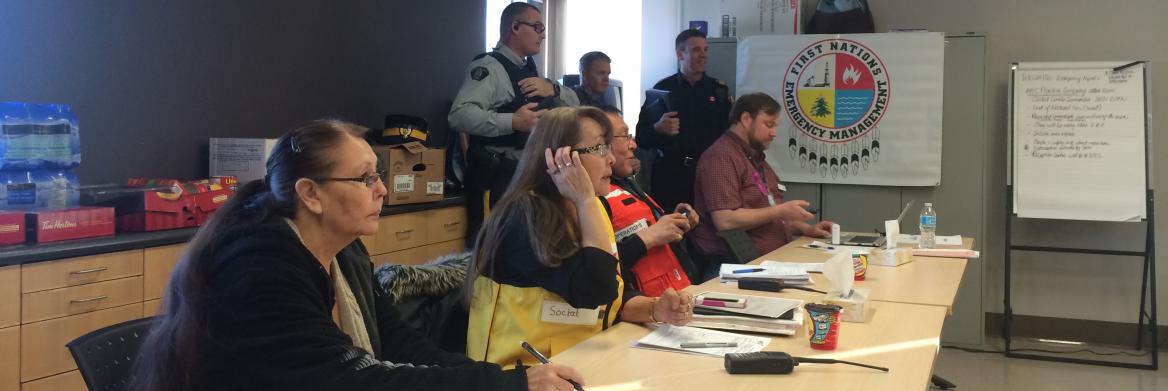Cpl. Martin Reed knocked on the door of a home in Chateh, Alta. The RCMP officer explained that a pipeline had burst, and the First Nation community was evacuating. The family had just five minutes to pack their bags.
While evacuations like this aren't uncommon in northern Alberta communities, this time was a little different: the emergency was planned and the evacuees were volunteers.
It was all part of a disaster training exercise co-ordinated by the Dene Tha' First Nation and the Alberta Emergency Management Agency last February 2016. The exercise in Chateh — one of three reserves in the Dene Tha' territory — was the first of its kind for an Alberta First Nation.
"We have different emergencies in different seasons," explains Andrea Godin, deputy director of emergency management for the Nation. "We're faced with flooding in the spring, forest fires in the summer and we're close to pipelines and oil wells so we want to be prepared if we ever have to evacuate."
Located 800 kilometres northwest of Edmonton, Chateh has been hit by several floods and fires in recent years. They've had to evacuate before, but never followed a structured plan.
"We had never assigned roles or practised what would happen," says Godin. "It slowed down the process because everyone was stopping to ask questions. But that's not practical in an emergency."
To improve the community's preparedness, the Dene Tha' emergency management team reached out to First Nation Field Officer Winston Delorme from Alberta Emergency Management. Together, they created a disaster plan and wrote a charter of delegations, which assigns roles to community representatives in the event of an emergency.
Then, Delorme led a week-long emergency management training session for all community stakeholders including the band council, community officials, RCMP, health services, fire, transportation and oil companies. The evacuation exercise was the last part of the training.
"It helped bring partnering agencies together to understand the roles of everyone," says Godin. "We have something concrete to follow now. It eliminates the confusion, the frustration and the anger."
Planning pays off
Just a few months later, the community — and the new emergency plan — was put to the test. In June, heavy rains poured into the Sousa Creek near Chateh. Several logs had jammed the water flow and the creek was bursting at its banks.
Hours later, the roads were flooded with water and a meeting was called with the heads of the First Nation. Delorme, who works with 17 other communities, joined in by phone. They asked him if they should activate the emergency plan.
"I said 'yes', and told them to get the ball rolling," says Delorme. "The emergency was different but the evacuation was the same."
Delorme says his goal is to make communities like Chateh self-sufficient, so that when a disaster strikes, they can keep their residents safe.
"The training exercise was very beneficial because I didn't have to be there right away," he says. "I didn't have to organize or tell people what to do because they had already practised; I was just a support role."
The band council declared a local state of emergency, and the plan was put into action. RCMP were deployed to knock on doors and evacuate residents, road blocks were set up to mitigate traffic and limit access to flooded areas, and the local school was set up as a reception centre for evacuees.
Because of the flooding, 120 to 140 residents were displaced from their homes. They stayed at the school for 10 days, where they were fed and given regular updates about the status of the flood.
Reed says it's important for police officers to get to know community members before a disaster happens, to make the evacuation run smoothly and keep residents calm in the aftermath.
"Being posted to these smaller and isolated communities, you have to get out and meet people and partake in council meetings," he says. "It builds trust, so in the event of a disaster, you know who you're dealing with and how to best help."
Since the flooding in Chateh last June, Delorme says he's pleased to see more communities becoming engaged in emergency planning.
"They're setting up plans and holding meetings by themselves," he says. "They've seen what can happen and they want to be more prepared than they were yesterday."
